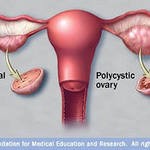Cataract Surgery and LASIK
My mother had cataract surgery a couple of years ago but she isn’t happy with her vision. Can LASIK help her?
Pregnancy and Diabetes mellutus
My mother has adult diabetes mellitus. I had it while I was pregnant. I am still a bit heavy and have mild hypertension. Do I need to worry?
Nummular eczema
My son has two round, itchy patches on his legs that I thought looked like ringworm, but Lotrimin isn’t working. What else could this be?
WHAT IS NEUROPEPTIDE Y
NEUROPEPTIDE Y
A protein in the brain that makes you crave carbohydrates.
The part of the brain that controls your internal organs is called the hypothalamus. The hypothalamus works almost like a central dispatcher, receiving messages from your internal sense organs and then dispatching messages to other organs instructing them to behave in a certain way. For example, if the hypothalamus gets a message that your blood glucose level is too low, it sends a message to stimulate your appetite.All of these messages are sent via chemical messengers, and neuropeptide Y is one of these chemical messengers.
PAIN MANAGEMENT SPECIALIST
Doctors with special training in pain management. Most pain, such as that from cuts and scrapes, is self-limiting and goes away within a few days or weeks. Chronic pain, usually defined as pain that lasts longer than three months, may require a specialist in its treatment. Some of the most common conditions that cause chronic pain are chronic headaches, persistent back pain, cancer, arthritis, and nerve damage, such as diabetic neuropathy.
POLYCYSTIC OVARY SYNDROME
A syndrome in women characterized by elevated levels of male hormone, absence of ovulation, infertility, and insulin resistance. It is estimated to affect up to 10% of premenopausal women. Polycystic ovary syndrome (PCOS) often causes the body to express male characteristics such as facial or chest hair and male-pattern hair loss, as well as obesity.
PROTEINURIA
The presence of protein in the urine, an early sign of kidney disease. One of the major medical complications of diabetes is diabetic nephropathy, a type of kidney disease that develops slowly over the course of years. Diabetic nephropathy can lead to end-stage renal disease (kidney failure), necessitating dialysis or kidney transplantation. In fact, diabetic nephropathy is the leading cause of kidney failure in the United States.
RENIN
An enzyme released into the blood by cells of the kidney. Through a series of chemical reactions, renin converts angiotensinogen (a protein released into the blood by the liver) to angiotensin I. As blood passes through the lungs, angiotensin I is converted into angiotensin II, a highly potent vasoconstrictor (an agent that induces narrowing of the blood vessels). Angiotensin II stimulates the adrenal cortex to release aldosterone, a hormone that enhances sodium ion reabsorption by thekidneys. Sodium then moves into the blood, followed by water, and both blood volume and blood pressure rise.





